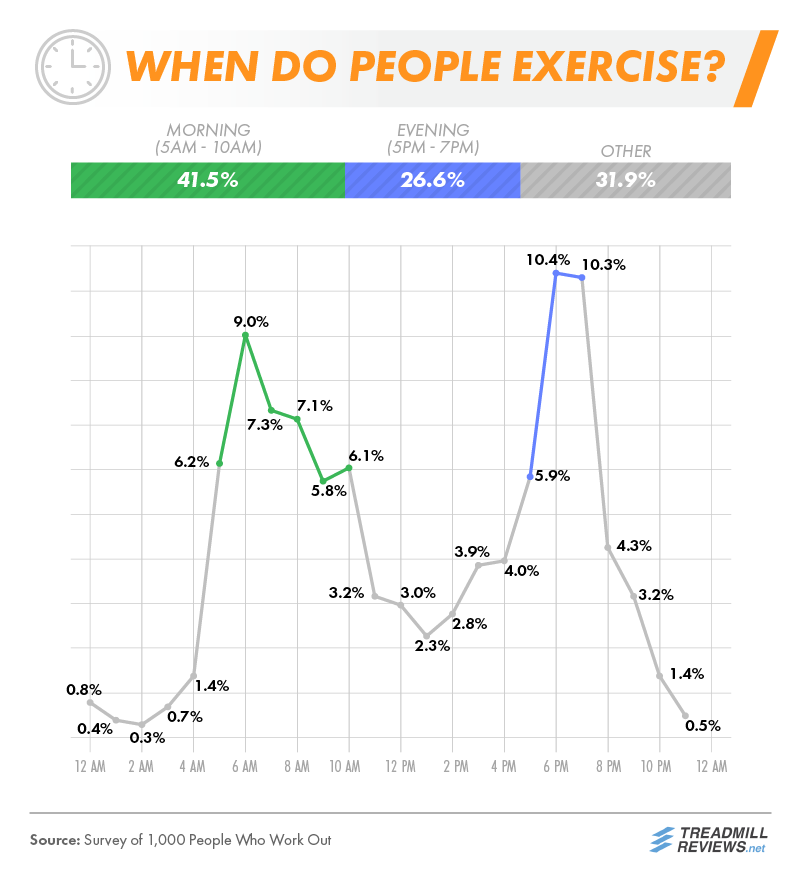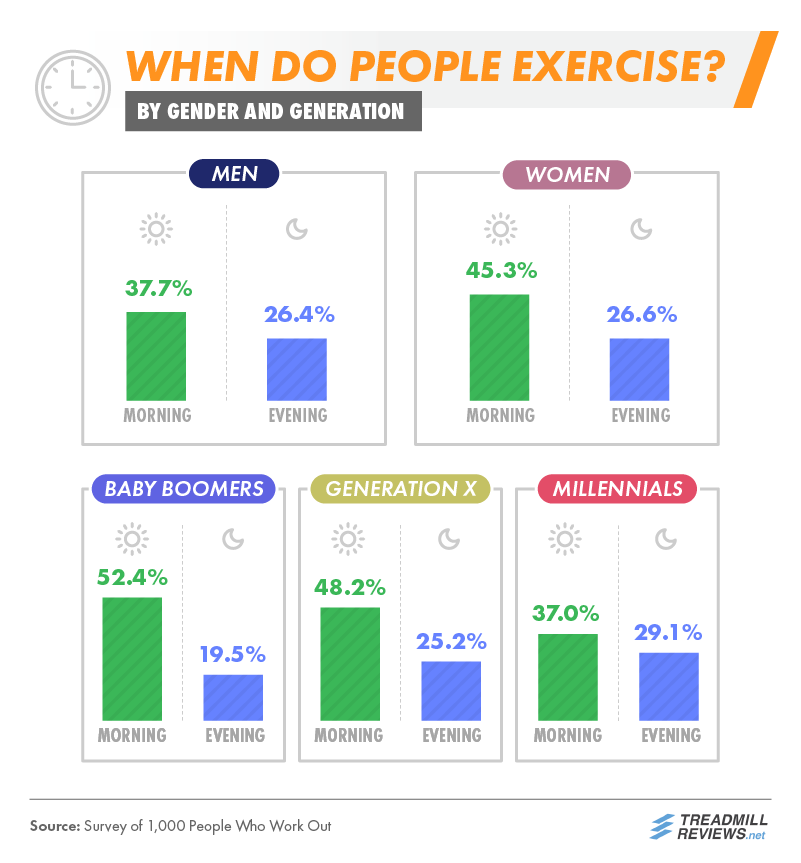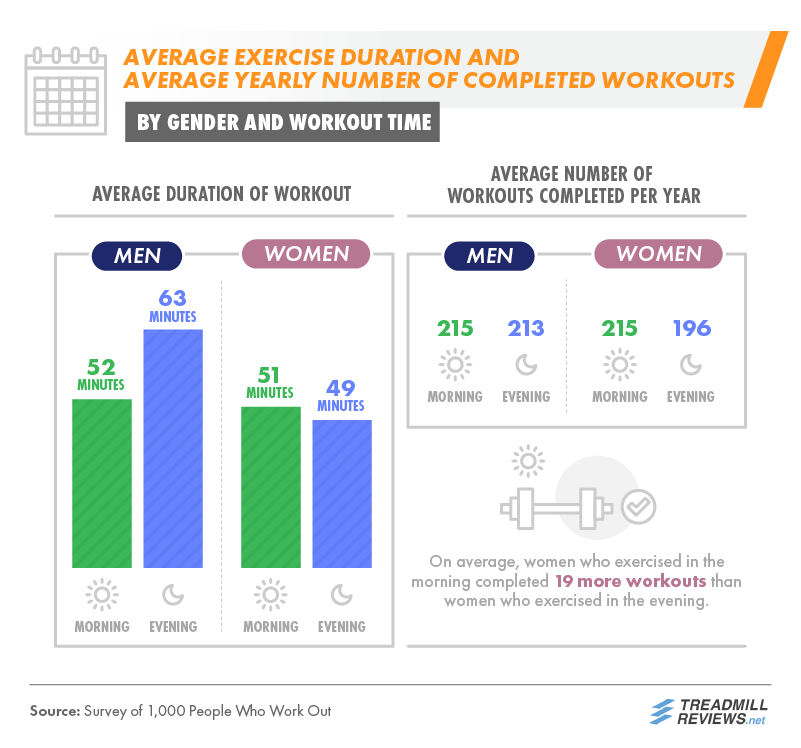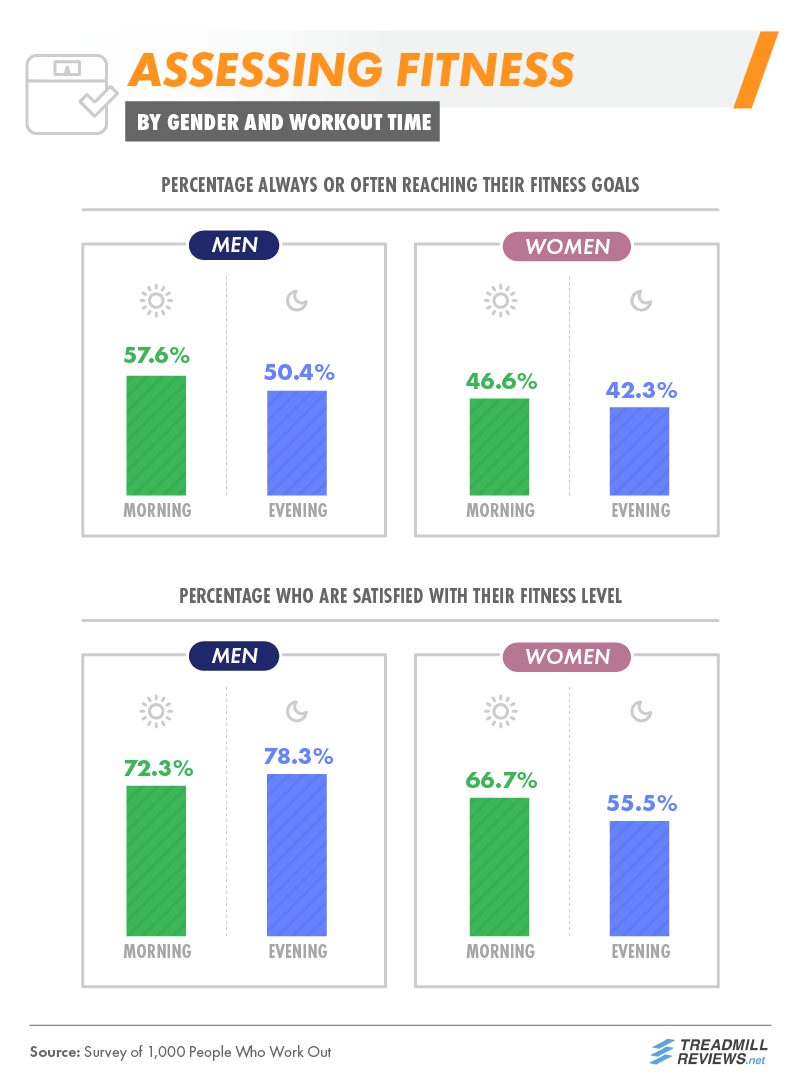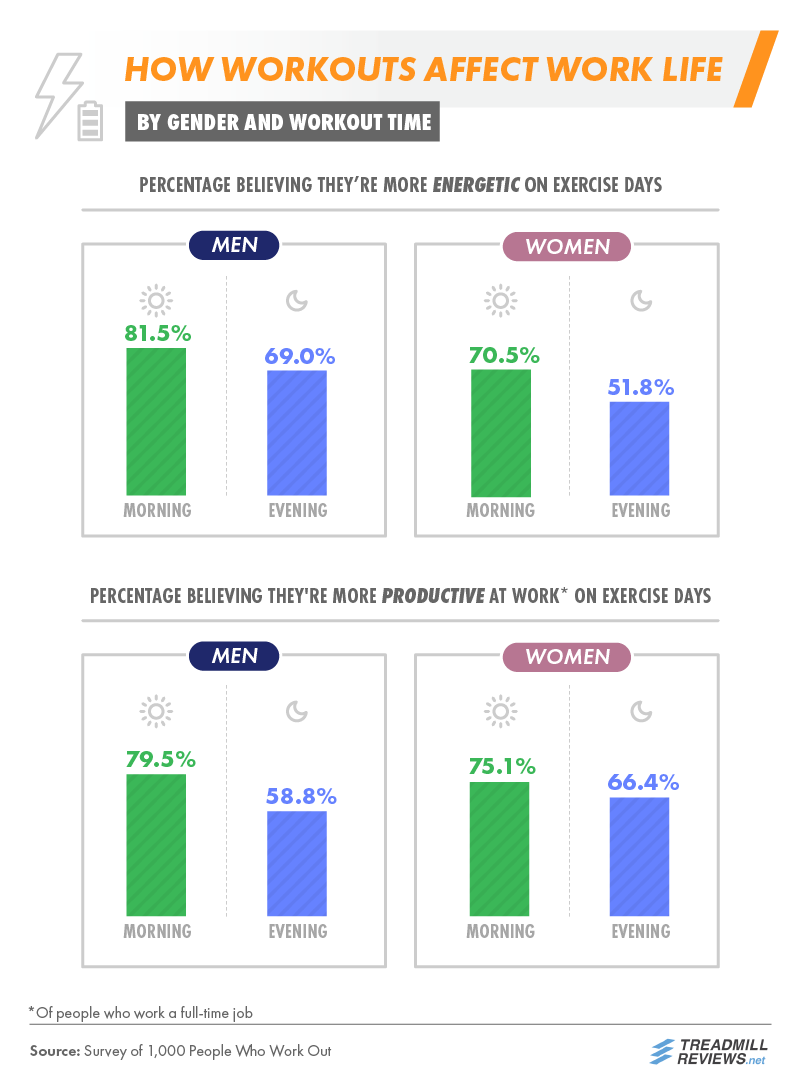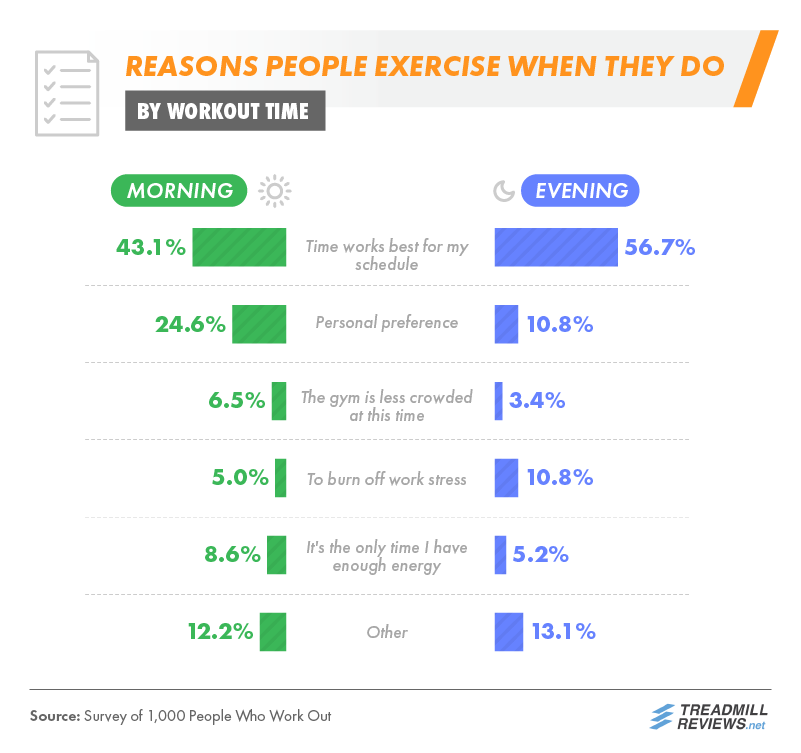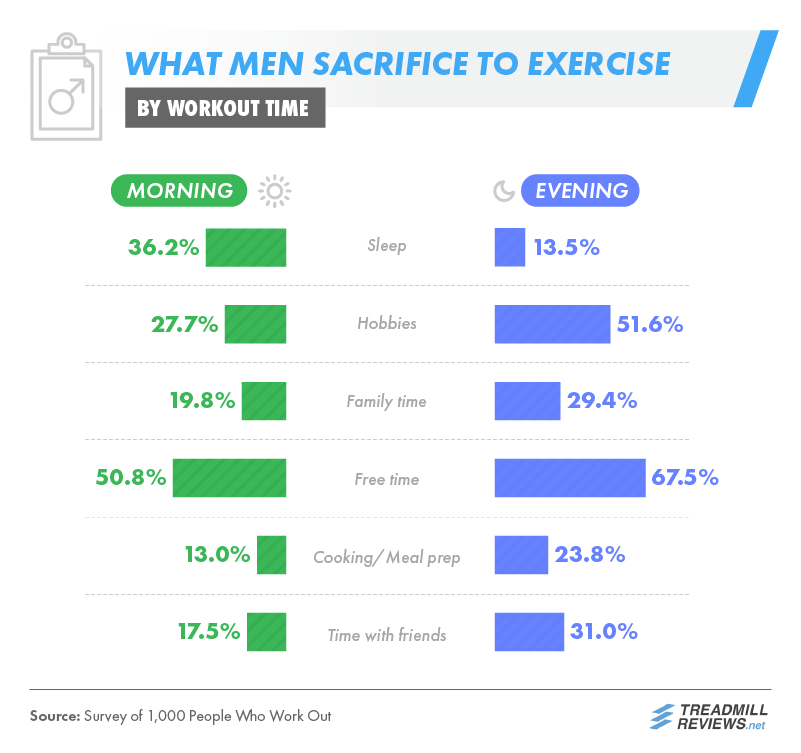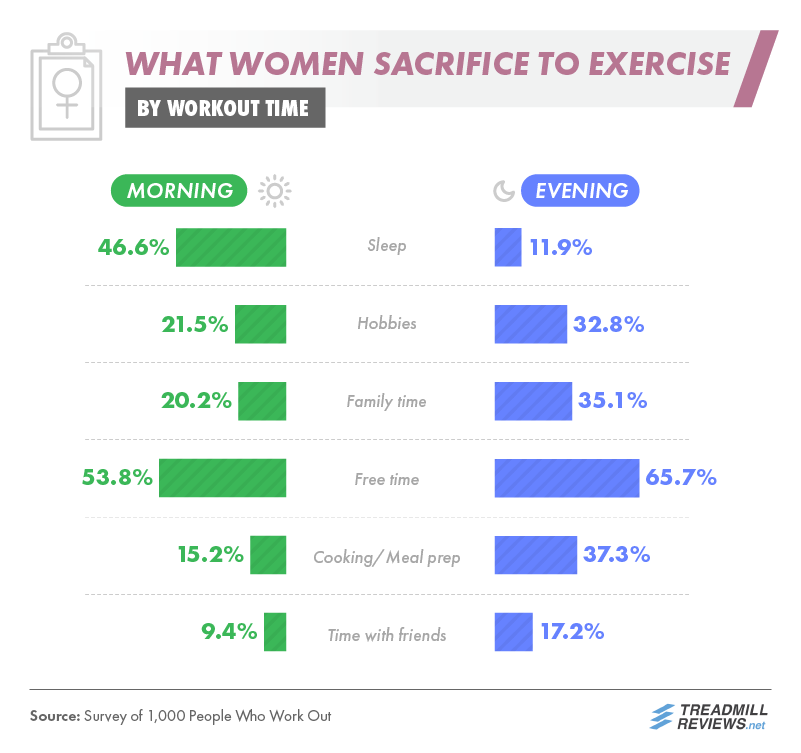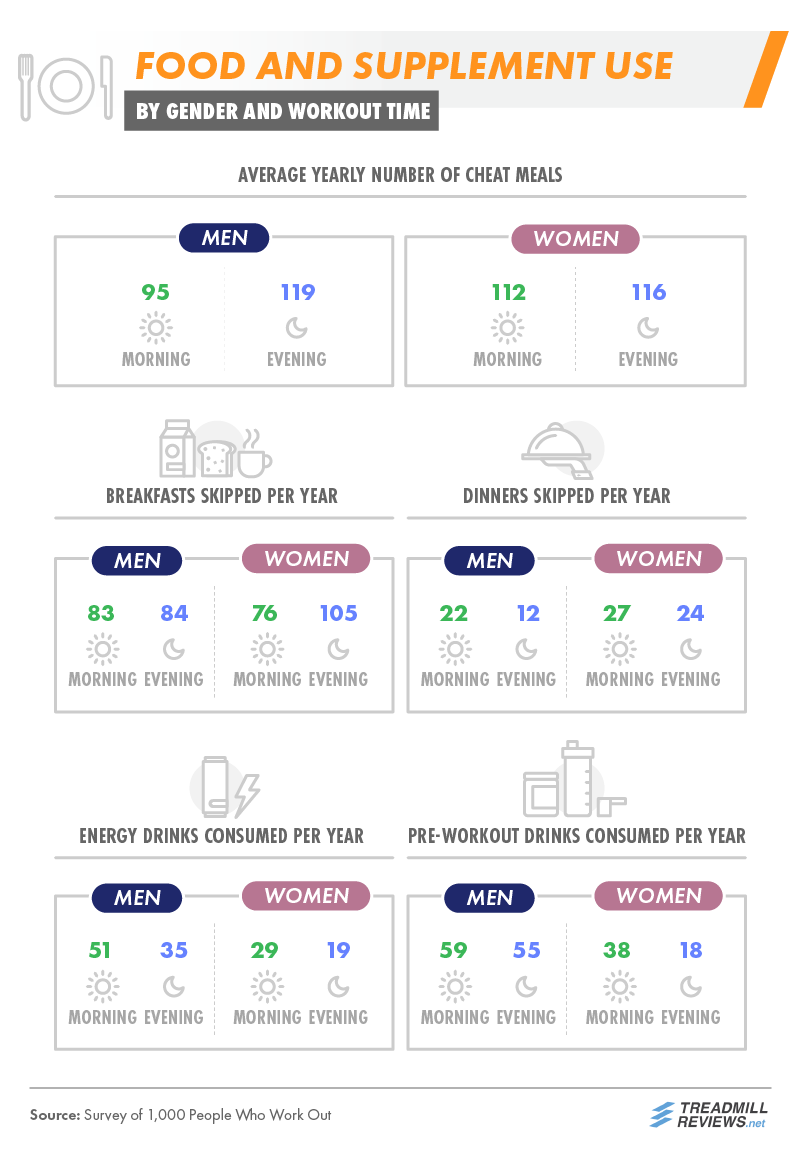At this point, you probably don’t need to hear how important working out is to your overall health. Even the less obvious advantages of getting your sweat on – increased energy, better creative streaks, and even better sex – are all relatively well-documented.
You don’t need anyone to tell you that you should work out, but it might be nice if someone said where you were supposed to fit gym time into your already hectic schedule. Sure, someone somewhere suggested biking to work or leaving work during your lunch hour to try and wedge in a few minutes on a walking treadmill, but is any of that realistic enough to turn into your long-term fitness routine?
Probably not.
At the end of the day, there are two real solutions that end up making exercise a possibility for working adults: Get it in early or do it late. If you’re already an early bird or a night owl by nature, the choice may be obvious. But are there benefits you might not know about in hitting the gym first thing in the morning or before you fall into bed? To find out, we polled over 1,000 people about when and how often they work out and how they really feel after the sweat session has worn off. Read on as we break down the difference between morning vs evening workouts to find out who’s getting the most out of every calorie burned.
Fitting in Your Fitness
The hardest part of working out isn’t building up enough endurance to run a long race or figuring out which exercises will actually be effective at targeting your problem areas; it’s finding a routine that works well enough that you’ll get up and go on a regular basis. It won’t necessarily be easy, and it could take some serious trial and error to get it right, but you’re more likely to see the long-term results you’re looking for if you can commit to a program that works.
Overwhelmingly, we found a vast majority of people who exercise chose to get their workout in the morning as a start to their day. With nearly 42 percent of people working out in the morning (including peak times between 6 and 7 a.m.), less than 27 percent did the same in the evening (including peak times between 6 and 7 p.m.). The other 40 percent managed to squeeze in their exercise of choice during different hours of the day, including the over 9 percent who worked out between 10 and 11 in the morning. Across the board, working out during traditional lunch hours (from noon to 2 p.m.) were among the least popular hours of the day.
Power Hour?
Setting the alarm an hour early or committing to getting out of bed when you’d rather sneak in a few extra winks is already hard enough, but there are plenty of benefits to incorporating an early rise into your workout routine even if it sounds grueling when you’re going to bed the night before. You’ll burn more fat, sleep better when the time comes, and feel more energized throughout the day.
For the most part, men and women we polled were keen to take advantage of those perks. Nearly 38 percent of men and 45 percent of women preferred to exercise in the morning compared to roughly 26 percent each who opted for evening hours instead. While more than 52 percent of baby boomers and 48 percent of Gen Xers who work out got their sessions in at the start of their days rather the end, fewer millennials said the same.
Only 37 percent of millennials worked out in the morning and 29 percent in the evening. Compared to other generations, studies show millennials average more sleep and tend to prefer flexibility when it comes to their schedules and routines. While they were less likely to work out in the morning than some older generations, they didn’t universally opt for evenings either, making random times throughout the day popular options as well.
Routine Workouts
Perhaps the biggest benefit of working out in the morning isn’t about burning more calories or putting on muscle mass; it’s getting into a rhythm that makes you actually want to work out.
Even though they didn’t go much longer in their session duration, preferring to exercise at the beginning of the day yielded an average 19 more annual workouts for women compared to those who worked out in the evening. That might not seem like a lot over the course of an entire year, but choosing to work out in the evening led to 38 more hours of exercise for men, while waking up early helped generate 23 more hours for women. Imagine if you spent that hour biking at a moderate pace in a spin class or or running on one of the top of the line running treadmills, like Horizon 7.4 AT, by Horizon Fitness or Sole TT8, by Sole. At an average of 520 calories per hour, that would amount to burning between 11,000 and 19,000 extra calories a year just for working out at a specific time of day.
Compared to their morning routines, men who worked out at night averaged an extra 11 minutes per session, but two fewer workouts annually. Sweating by moonlight also has a unique set of perks including more intense sessions, faster toning, and better sleep once you’re finally ready to call it quits.
Aiming for Your Health Objective
Almost no one works out just for the heck of it, which means setting clear goals is often the key to both a successful and consistent workout routine. With nothing to work toward, the odds of actually getting up early or staying up later to squeeze in a few laps in the pool are slim to none.
Being satisfied with your fitness level may be the kind of thing that takes time to accomplish, but meeting your goals and feeling good about them may be more readily achieved when you commit to exercising in the mornings. Nearly 58 percent of men and 47 percent of women who worked out in the morning said they often or always met their fitness goals. And while men were slightly more in tune with their overall fitness when they worked out at night, more than 2 in 3 women who opted to work out in the morning felt confident about their fitness level, a higher rate than women who worked out in the evening.
Pumped Up
Whether you prefer to go for a jog around the block or bang out a few reps in the weight room, exercising releases natural endorphins in the body that help boost energy, improve heart health, and sharpen focus.
Nearly 82 percent of men and 71 percent of women who worked out in the morning said they were more energetic on exercise days. For women, that represents a nearly 20 percentage point increase over people who said it was nighttime sweating that helped them feel ready to take on the following day.
And while it may be more difficult to qualify, close to 80 percent of men and roughly 75 percent of women who voted for a.m. sessions said they were even more productive on the days they worked out. Fewer than 59 percent of men and 67 percent of women who worked out at night said the same.
Motivating Factors
If exercising isn’t already a regular part of your daily or weekly routines, there is usually a pretty common list of reasons why. You may not feel the need to work out for health reasons, or maybe you just really don’t like exercising. But the reality for most people is one excuse trumps all the rest: time.
As it turns out, most people who opt to either work out in the morning or the evening aren’t necessarily doing it for the benefits of being an early riser or a night owl; they do it simply because it fits into their schedule best. For both morning exercisers (43 percent) and evening grinders (57 percent), the most popular reason for picking their workout time wasn’t preference or convenience; it was about conforming their fitness efforts around other obligations. And while roughly 1 in 4 early birds did actually elect to exercise in the morning on purpose, people staying up later to get their workouts in were more likely to do so to help them burn off the stress of the day. The same endorphins triggered by physical activitythat help keep you energized after a few minutes on the treadmill or strength training can also help to relieve stress regardless of when you end up in the gym.
Prioritizing Your Health for Men
When you’ve already got a full calendar of events throughout the week and even your weekends start to get bogged down by errands and family time, it’s fair to say that there are certain sacrifices associated with finding the opportunity to fit in a workout when you might otherwise prefer to do something else.
For men, nearly 51 percent of early exercisers and 68 percent of those active at night agreed the biggest sacrifice they made to prioritize their fitness was free time. When you’d rather be binging on Netflix or reading a good book, opting out for a sweaty session at the gym might sound like the last thing you want to do. And while men working out in the evening were more likely to give up their free time, those getting up in the morning to make it the gym were nearly three times more likely to give up sleep to make it happen.
Overall, there were typically more sacrifices associated with working out at night. Men fitting in their exercises at the end of the day were more likely to lose time with friends and family, meal preparation time, and time for their hobbies compared to men working out in the morning.
Prioritizing Your Health for Women
Like men, women working out at night made more sacrifices throughout the day than those who opted to work out in the mornings.
Forfeiting their free time was a common cost of having time to exercise regardless of the time of day. And while women waking up earlier to get their sweat on gave up sleep far more often than women staying up late, nighttime lifters and runners experienced more sacrifices in other parts of their lives. Evening workouts made women twice as likely to lose out on meal prep and cooking time and nearly twice as likely to miss opportunities to socialize with friends.
Taking a Day Off
If you’re looking to get fit, working out alone may not do the trick. Monitoring what you put into your body (and how often) can have a huge impact on how quickly you achieve whatever goal you’re working toward. Still, dieting around the clock might not be the solution you’re looking for either. Whether it’s just one meal or the entire day, fitting in a “cheat” here or there can actually be good for helping you stay on track.
As it turns out, what time of day you end up fitting in your workout could be affecting your eating habits more than you know. Both men and women who decided to exercise at night rather than in the morning averaged more cheat meals per year than their early bird counterparts. While the difference was smaller for women (just four cheat meals either way), men who worked out at night averaged more than 20 extra indulgent dinners or snacks every year than men who committed their mornings to their fitness routines.
Working out in the morning made people more likely to skip out on a meal, either breakfast or dinner. Similarly, both men and women working out in the morning also drank more energy drinks per year (between 29 and 51). And even though the occasional energy drink won’t kill you, drinking them in excess certainly isn’t good for your health.
Some people work out because they’re looking to drop a size or two in the waist, and some people are just looking to post a better personal record for their long-distance runs. But did you know working out on the regular could be good for your libido too?
No matter what time of day you’re exercising, you’ll likely get the added boost in the bedroom – though the effect isn’t universally equal. People we polled who worked out in the morning had sex every five days on average, compared to every six days for those getting the same sessions in at night. Perhaps sex might be another potential sacrifice of the evening workout routine.
Making It Count
As we’ve discovered, the most important part of your exercise routine is the part where you get up and actually go. It can be a walk around the block, a spin class, or even a yoga session to help you feel more flexible throughout the day. Whether you decide to wake up early to fit in your fitness efforts or stay up late to try and burn those extra calories, getting any workout in is better than doing nothing at all.
Nevertheless, our study revealed there are serious benefits to working out in the morning instead of waiting until the end of the day to fit it in. Not only does exercising first thing in the morning make you more likely to exercise more often, but you may also crave fewer cheat meals and need fewer energy drinks to keep you going throughout the day. Even though just getting into the gym or going outside to get your workout in is a great place to start if you’re thinking about instituting a new fitness regimen, opting for the morning may help set you up for long-term success better than evening workouts.
Methodology
We collected survey responses from 1,000 people who exercise from Amazon’s Mechanical Turk. 48.6 percent of our participants were men, and 51.4 percent were women. Participants ranged in age from 18 to 80 with a mean of 36 and a standard deviation of 11. If a respondent did not exercise at least once a week they were disqualified from the survey. Respondents who exercised between 5AM and 10AM were grouped into the morning category. Respondents who exercised between 5PM and 7PM were grouped into the evening category. This times were chosen because at least 5% of people exercised during one of the hours in that time frame.
About TreadmillReviews
Whether you’re looking for a cheap treadmill, a foldable treadmill to fit your small home, comparing the best treadmill reviews, or figuring out the treadmill dimensions and size of a treadmill, our trusted treadmill experts have you covered with their unbiased reviews.
Fair Use Statement
Trying to decide if you should sleep in or stay up late? We feel you. To help make the decision easier for your readers, we welcome the use of any results or graphics found within this project for noncommercial use. We simply ask that you include a link back to this page so our contributors also earn credit for their work.


